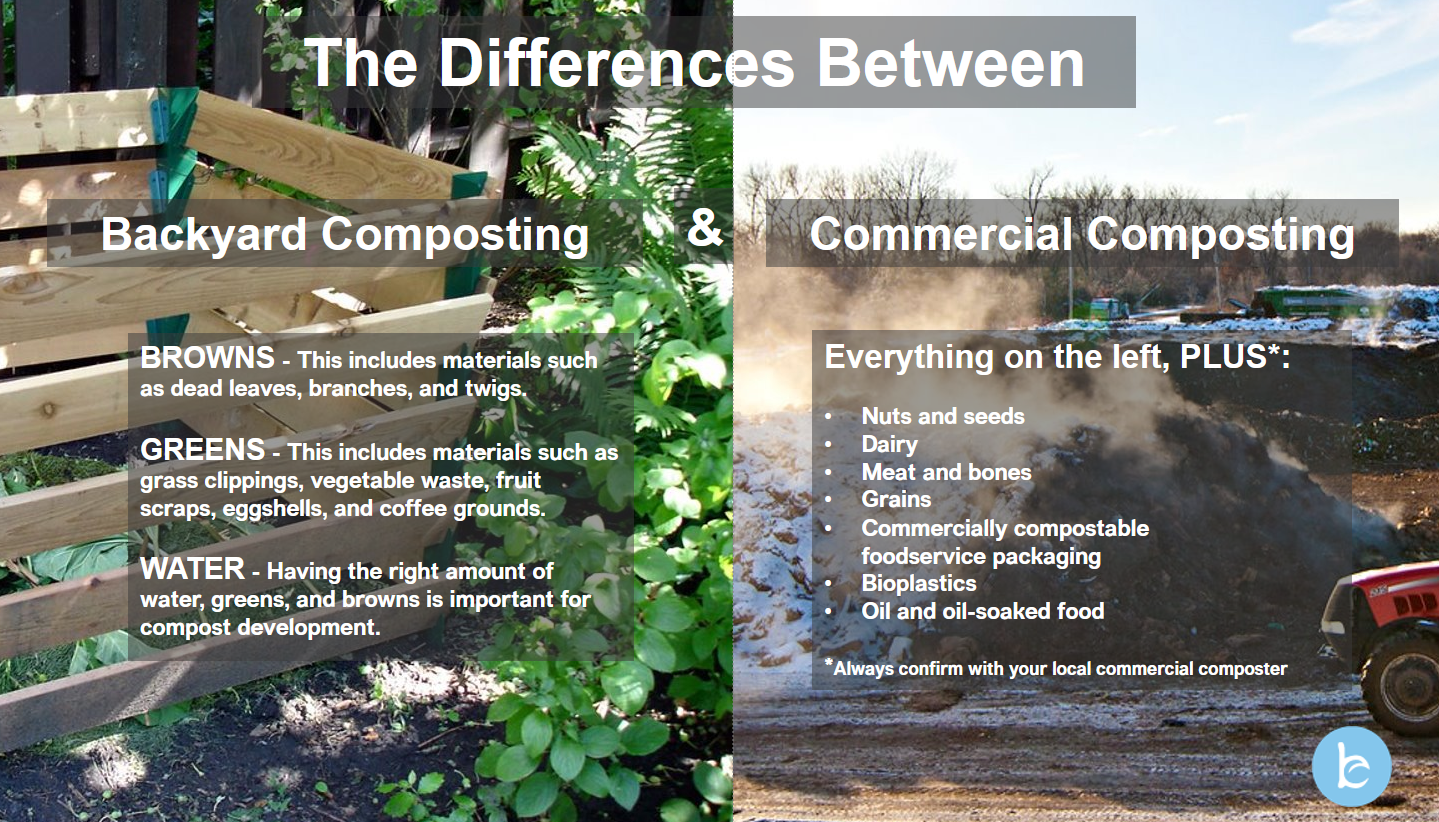Healthy soil is key to just about all life, and yet, we’re losing the equivalent of two football fields of soil every minute, according to a new report from the Center for American Progress. Because of our depleted soils, we now have to eat EIGHT oranges today to derive the same amount of nutrients from the ONE orange our grandparents ate.
At Better Earth, we recognize the urgency of this issue and are on a mission to protect and revitalize our soil. We do this through education, empowering partners across our value chain, and continuing to help our customers switch petroleum-based single-use plastics to plant-based compostables, which in turn can be composted into a nutrient-rich soil amendment.
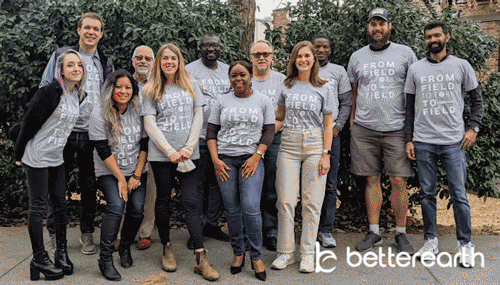
Better Earth team visits the CompostNow King of Crops Farm and Composting Site.
The team was recently together for our end-of-year team retreat, and we used the opportunity to visit our partner CompostNow at their compost facility located on King of Crops, a 70 acre farm in Douglas County, GA. We got down n’ dirty and immersed ourselves in the composting process and the challenges composters face. Through our compost site visit guided by David Paull, co-founder and Chief Impact Officer of CompostNow, we explored the question of how we as compostable solutions providers can better support our composting partners close the loop and revitalize our depleting soil. We can’t wait to share what we learned with you!
Let’s start with the fundamentals.
First, what qualifies as “compostable”?
- Compostable products can include food scraps, paper, leaves, certified-compostable products like Better Earth foodservice packaging, and so much more carbon and nitrogen materials. The speed of degradability will vary per compost pile.
- Commercially compostable means that a product can break down into nutrient rich soil amendment in about 90 – 180 days or less in a commercial composting facility with the support of microorganisms.
- Not all commercial composters accept all food scraps or compostable packaging, and home compost bins definitely can’t have meat, bones, dairy, fats/ oils, or bioplastic compostable packaging. We recommend always checking with your composter on what they accept.
Pro Tip: Labels can be misleading.
When disposing commercially compostable products, look for:
Industry standard third-party certifications:
Also look for the words:
- Commercially compostable only. Facilities may not exist in your area.
- Commercially compostable
- Compostable in an industrial facility
- Meets ASTM-D6400 standard
For home composting, look for
- OK-Compost/TUV Certified (Home)
- Home or Backyard Compostable
Second, why is composting food waste and compostable to-go packaging important?
David Paull, Co-founder and Chief Impact Officer of CompostNow speaking on the importance of revitalizing our soil.
- Compostable packaging can be a catalyst for diverting both food waste and plastic from landfills.
- In 2010, the Environmental Protection Agency estimated that more than half of all municipal solid waste in landfills was compostable.
- Takeout orders account for around 269,000 US tons of plastic waste that has entered the oceans. According to the NOAA Ocean Service, plastic doesn’t decompose and can stick around indefinitely. And every day, more cities, counties, states and even countries are joining the movement to ban single-use plastics in favor of sustainable alternatives like compostable and reusable products.
- Compost alone has the power to sequester a year’s worth of carbon emissions. MWhen organic matter decomposes in a landfill, it creates methane, a greenhouse gas 25x more potent than carbon dioxide, and other greenhouse gases. When food waste is composted in an aerobic composting process, instead of creating greenhouse gases, it can sequester and store carbon–an essential nutrient for plants! It still does create some carbon dioxide but small enough amounts that it is sequestered by the finished compost piles or trees nearby.
Third, what if I’m already recycling? Isn’t that enough?
- Unfortunately, no. This was a hard truth for our team to grapple with too, but what motivates us to do what we do every day. Only 9% of all plastics ever made have been recycled, and when they are recycled, they can only be recycled a few times before they lose their market value.
- Conversely, compostables are infinitely renewable through the commercial composting process and never lose their value.
- Day-to-day, our habits tend to comprise of creating, consuming, and discarding, or what we call the “linear economy.” Composting is a great way to reframe our thought process and participation in a linear system of consumption and consider how we can contribute to a more circular system that regenerates our communities. This ultimately affects our soil vitality, food quality and collective health in so many positive ways while simultaneously diverting both food waste and unnecessary plastic pollution. So much waste is created in the name of convenience. Let’s change this!
So with that in mind, what are the biggest challenges our nation’s commercial composters face that I should be aware of?
Here are some of the insights gathered from our visit to the CompostNow farm.
Challenge A: Growing Composting Education, Building Infrastructure & Participation
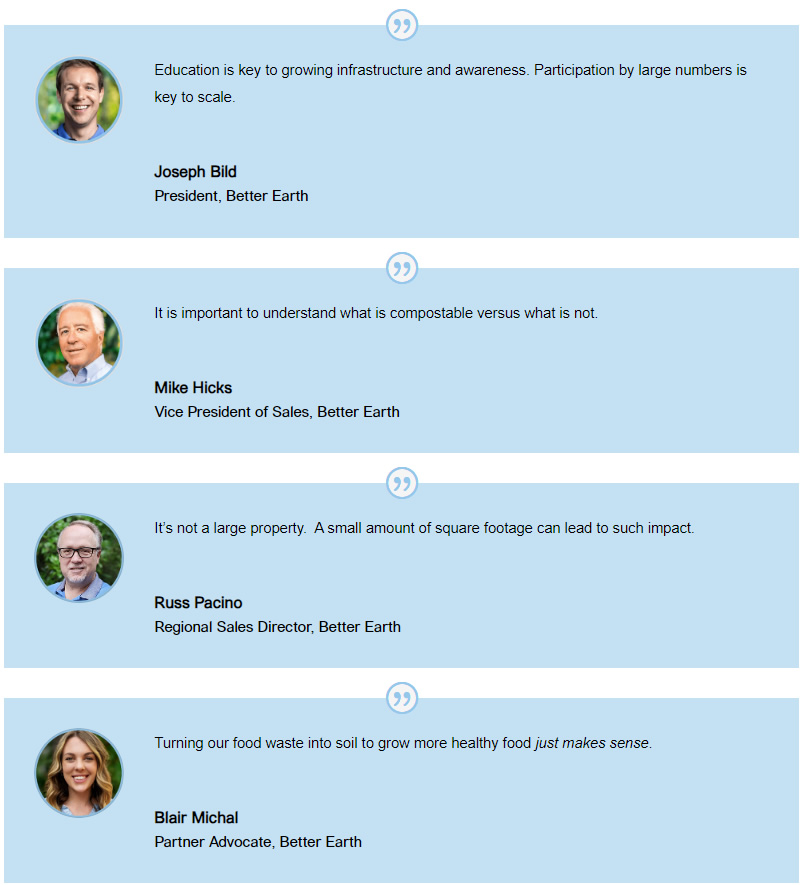
Challenge B: Ensuring Products are Labeled for Responsible Disposal to Grow Compostable Packaging Acceptance at Commercial Composting Facilities
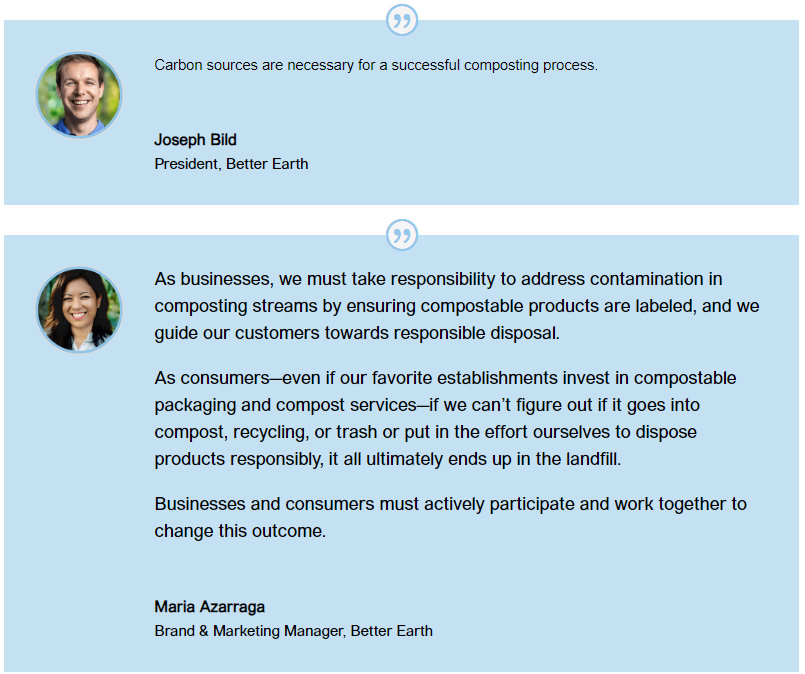
Challenge C: Realizing the Impact of Irresponsible Disposal & Contamination of Non-compostables
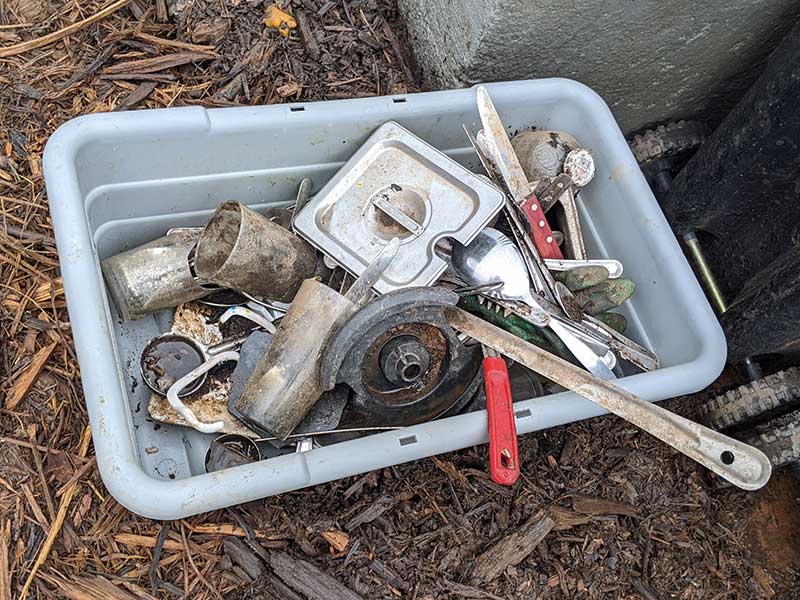
We were taken aback by the amount of non-compostable material being pulled out of the sorting piles from various plastic materials to dangerous knives and other stray pieces of metal and glass!
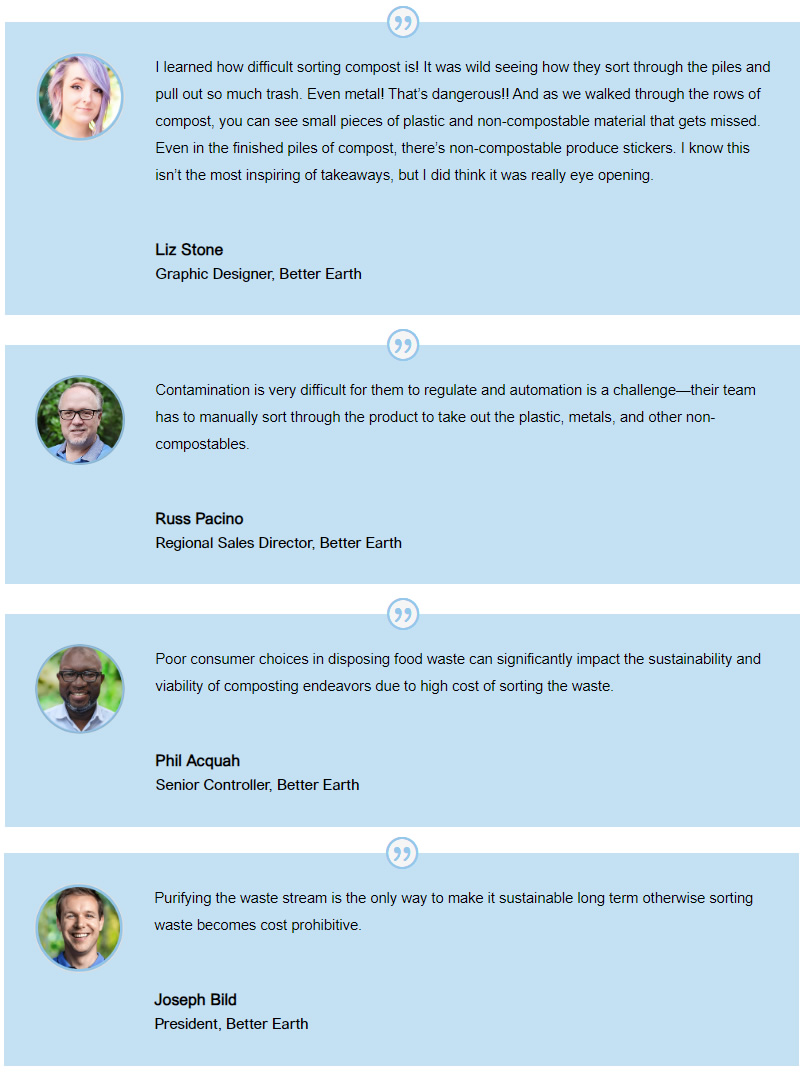
Wow! How can I, as an individual, help?
We’re so excited to do what we can in the new year and beyond to help our composters revitalize our soil responsibly. Here’s how you can join the compost movement!
Did you know David Paull at CompostNow started with his Subaru station wagon and trailer to pick up compost? It takes just one brave person to ignite positive change. The best place to start is within our own communities whether that’s our friends, family, farmers markets, religious gatherings, HOA meetings, favorite restaurants, festivals, sporting events, and more. Composting is such a simple solution that will result in more nutritious food, healthier environments and ultimately healthier people within our communities. Please share this blog post to spread the word.
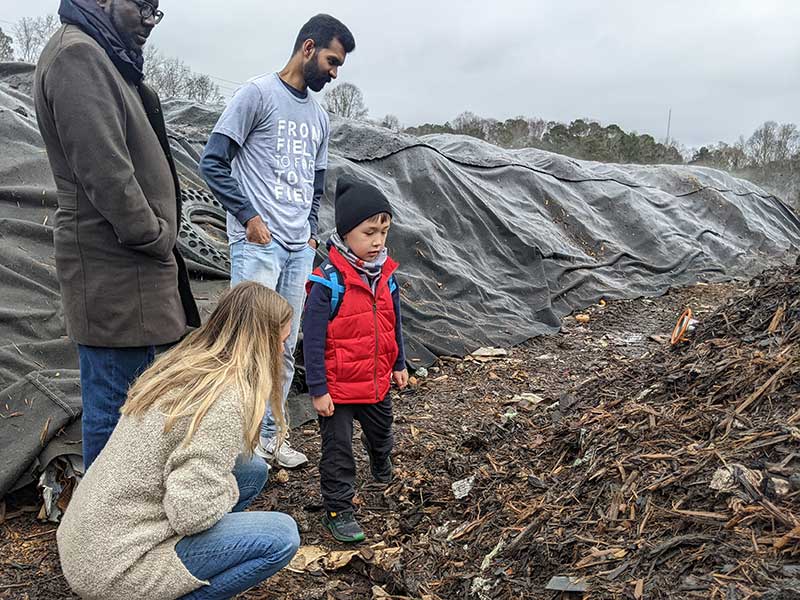
Better Earth team members Phil, Rahul, and Blair with Future Climate Warrior Aiden taking a closer look at a compost pile in progress.
We know it’s easy to just throw something away wherever out of inconvenience, but bad habits can always be changed. We can start by setting the example for others around us to responsibly dispose waste materials. Take it one step at a time! Help those around you learn and hold each other accountable whether that’s at your work break room water station, household chores like taking out the trash with roommates or family, or a party aftermath clean-up.
For composting, we recommend becoming familiar with the commercial and home composting labels mentioned previously to best inform responsible disposal. Always be aware of what materials your composter will accept vs not, whether its food scraps, animal waste, bones, shells, branches, sawdust, compostable fiber packaging, compostable bioplastics, and more.
For recycling, we recommend learning about the label numbers associated with different recyclable plastics to identify what your local curbside recycler picks up vs what you can save to take to a local recycling facility that takes the less accepted materials. For example, most curbside recyclers do not accept plastic bags or glass. Check with your local groceries, farmers markets, and more as many now accept plastic bags and other recyclables. Save these recyclables in reusable containers that you can drop off when convenient.
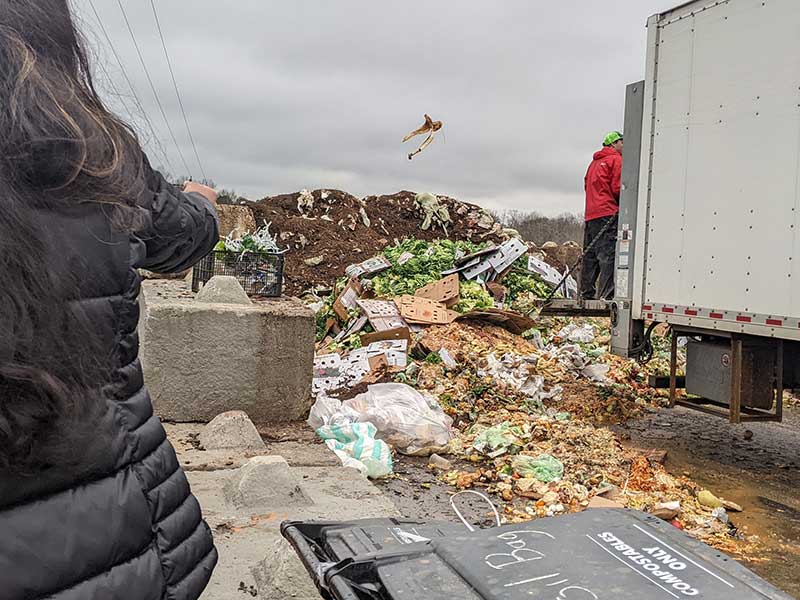
Better Earth team member Preethi throwing her consciously-saved banana peel from breakfast into the sorting pile. Kudos to our team member Liz Stone for the fantastic action shot!
We must all consciously consider what happens to what we create, consume and discard in our communities as both businesses and consumers.
Let’s think about our communities and ask ourselves:
- When I throw something away, where is away in my home community?
- Who processes that waste material in my home community?
- And what is the lasting impact of that product waste in my home community?
- How might I improve my circular thinking and better control my linear consumption habits?
- Are my day-to-day decisions contributing to something better or worse in my community?
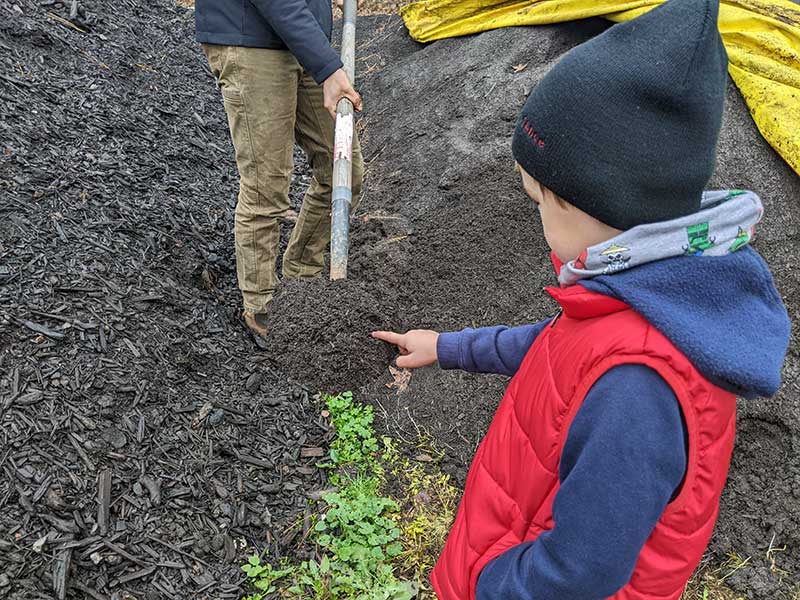
Future Climate Warrior Aiden admiring the beautiful nutrient rich finished compost.
Click here for more information on commercial composters in your area.
We recommend finding a local community garden that has a compost drop-off site. You can also transform most of your food waste and yard trimmings into nutrient-rich fertilizer using a backyard composter. Check out this Better Earth blog post to learn how to build your own backyard composter in 10 minutes or less.
Most fiber compostable packaging can break down just fine in a home bin. For good measure, look for the OK Compost or TUV Home Compost certification on your packaging to confirm home compostability.
Never place compostable packaging in your recycling bin. Keep our recycling and composting streams clean of contamination!
When in doubt, throw it out! If there is no composting service available, we recommend disposing compostable packaging into a landfill bin as a last resort.
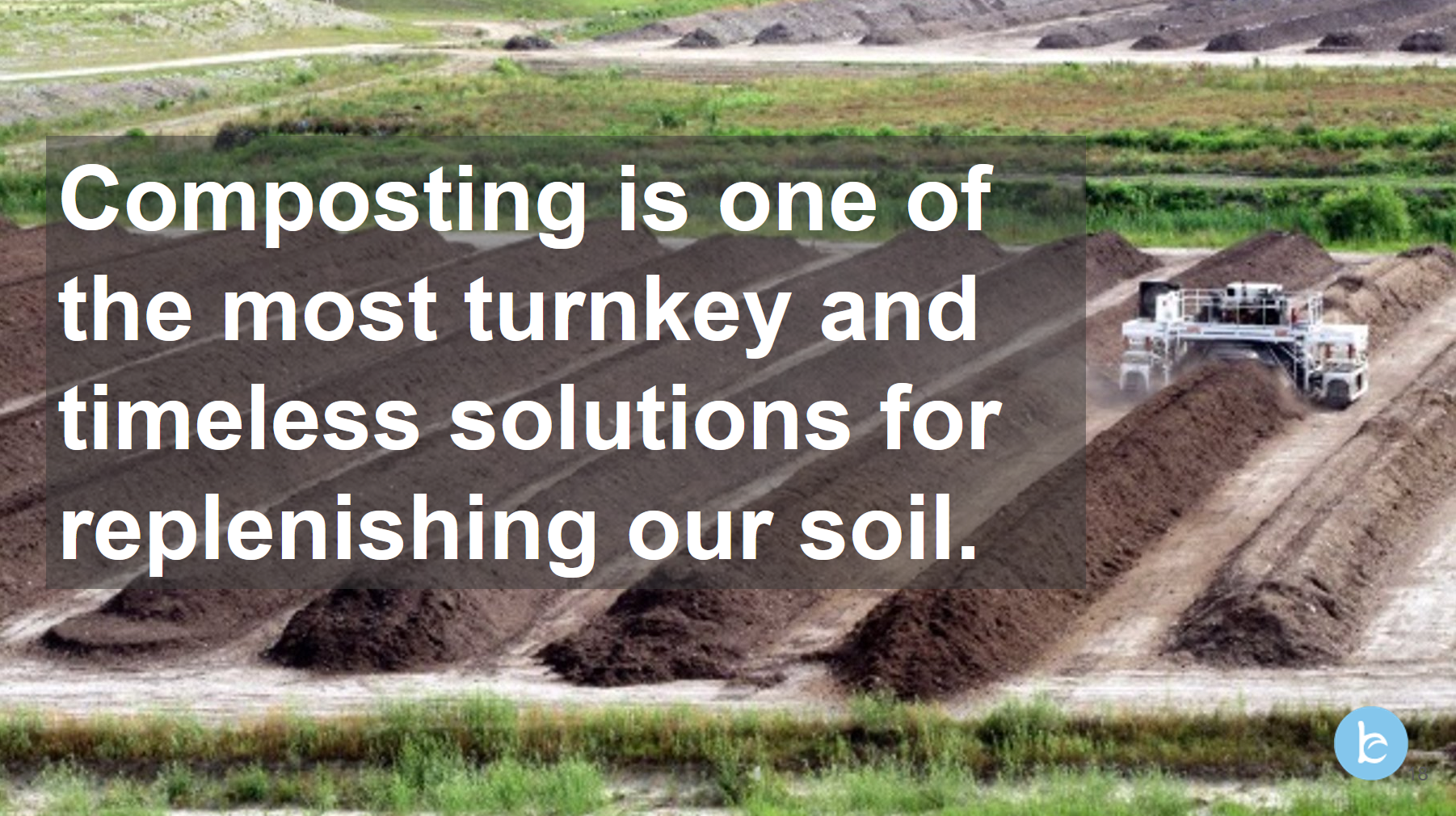
Join us in advocating for more composting education & infrastructure in your community and across the United States by reaching out to your local, state, and federal representatives and supporting the proposed COMPOST Act. This way we can all close the loop between plant-based materials and their rightful home: back to our soil!
